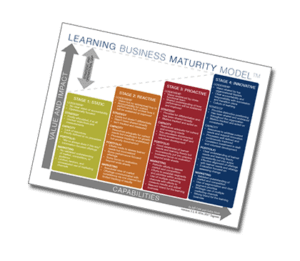Lifelong learning is the imperative of our age and those who lead learning in their fields will lead their fields.
As part of our continued efforts to help others lead change in our industry, we thought it appropriate to create a manifesto for organizations in the business of lifelong learning – and this is the core principle behind it.
In this episode of the Leading Learning podcast, we revisit our definition of a learning business and delve into the five supporting principles behind our newly created manifesto.
To tune in, just click below. To make sure you catch all of the future episodes, be sure to subscribe by RSS or on iTunes. And, if you like the podcast, be sure to give it a tweet!
Listen to the Show
Read the Show Notes
[00:20] – A preview of what will be covered in this episode.
[00:30] – Thank you to Castle, the sponsor of the Leading Learning podcast for the second quarter of 2017. Castle is an accomplished full-service certification and licensure testing company that also offers its clients a variety of learning solutions capabilities. With an expert team of testing and instructional design professionals and a thirty year history of excellence in it’s field, Castle understands what it takes to develop and deliver quality learning and certification programs.
[01:04] – The recordings from our recent Learning • Technology • Design™ (LTD) virtual conference (held March 1–3, 2017), are now available. We created LTD specifically for professionals in the business of continuing education and professional development and you can get access to all of the great content delivered at the live online event. Please note these recordings are only available until May 15, 2017. Find out more at ltd.leadinglearning.com.

[01:38] – Highlighted Resource of the Week: Learning Business Maturity Model
We’ve discussed this before in an earlier podcast (see, Episode 56 – The Learning Business Maturity Model ), but we have not actually highlighted it as a resource, and it is closely related to the manifesto that will be discussed in this episode.
The model addresses five stages of maturity for organizations in the business of lifelong learning and five knowledge and skill domains across those stages.
You can find a full explanation and a visual of it at https://www.tagoras.com/maturity. You can also sign up to get access to the free assessment that accompanies the model.
Defining “Learning Business”
[02:28] –The learning business manifesto is aimed at learning and education businesses, so what do we mean by “learning business”?
It’s important not to confuse this term with the term “learning organization”—i.e., an organization that pays attentions to what works and what doesn’t, adapts, grows, etc. In that sense, every business should seek to be a learning organization.
A “learning business” has to meet two criteria:
- A fundamental reason for its existence is to generate revenue through selling learning and education experiences to a target audience — in most cases, this means net positive revenue or profit.
- It has to self-identify as a business, meaning the majority of the people working in the business recognize that revenue generation is fundamental reason for the businesses existence.
What is not a learning business?
- Corporate training — most does not fall in the learning business category and while corporate training can and should contribute to business success, it is typically a cost center, and its audience is primarily internal to the company.
- Traditional academic institutions – Many public institutions are heavily subsidized and even for institutions that do have to generate at least break-even revenue – whether public or private – it is rare for this requirement to be emphasized – or, arguably, even recognized, outside of a small segment of the administration. So, they are shaky at best on the first criterion, and they rarely meet the second criterion.
There are exceptions, though, which can lead us to the types organizations that we do feel qualify as learning businesses. In the academic world, continuing education and extension programs often fall in this camp.
These parts of colleges and universities are often run more like private training and education companies – which are another type of organization we would definitely classify as learning businesses.
Lastly, most trade and professional associations are learning businesses or, at the very least, run learning businesses within their overall business. And we feel that is true whether an organization is selling education and training directly, or it provides access to learning opportunities as part of the benefit of membership.
In either case, learning is driving revenue, and should be treated as a business.
The Learning Business Manifesto
[06:05] – The manifesto is intended as a succinct way to state some of the key ideas and principles that should drive a successful learning business. We want to share because it underpins our thinking in general, and it certainly influenced the development of our Learning Business Maturity Model.
To start off, the manifesto states that,
Lifelong learning is the imperative of our age and those who lead learning in their fields will lead their fields.
In other words, learning is at the very heart of the value your organization offers. In today’s world where change is happening more rapidly than ever, where people are changing jobs more frequently than before, and where people are living longer, learning is not a “nice to have” or something that you can check off your list as completed when you leave high school or college or even grad school.
Lifelong learning is imperative.
[08:05] – The five supporting principles that go along with the baseline manifesto:
- Learners don’t value expertise. People value and pay for outcomes, for the application of what they learn. They really aren’t interested in features and inputs, despite what a lot of marketing copy conveys. Savvy learning businesses get this and don’t try to focus on the specific, fixed subject matter expertise they can bring to bear; instead they focus on offering highly relevant and practical learning opportunities that learners can apply to their work and their lives.
[09:43] –
- If you can’t see it, they can’t see it. The “it” here could be replaced by the words, “vision”, “value”, or “impact”. You have to have and articulate a vision for impact of your education, for the value of what you offer, for the measurable impact of what you’re doing. If you don’t articulate that vision or value or impact, you can’t assume learners will see it.
[11:27] –
- Good design is the enemy of impact. This is related to the idea that perfection prevents progress. A learning business can get caught up in the trappings of learning—the perfectly phrased learning objectives or the religious commitment to an interaction every two minutes in an e-learning.
What’s essential is setting the context—why this is important to learn—but that doesn’t have to happen through bullet points with action verbs. What’s essential is that learners engage with the content and begin applying it, and that may happen as readily by offering a reflection question verbally as by building slick interactions. A blind focus on best practice and process is very often at odds with innovation and iteration.
A minimum viable product (MVP), can be a great way to float a trial balloon and see if a new learning offering will have impact—but MVPs, by definition, aren’t polished; they don’t fit the classic “good design” definition—but they could have huge impact.
[14:27] –
- Marketing is education is marketing. We have a couple of points in mind related to this:
- The rise of content marketing and a focus on marketing that delivers educational value. A lot of marketing – really, most of the best marketing -is educationally-oriented at this point. Things like this podcast and the free Webinars that we offer are examples of this.
- Educational offerings are very often their own best source of marketing. Each educational offering that is part of your portfolio right now represents one of the best opportunities there is for highlighting and promoting other educational offerings that are in your portfolio or that you plan to produce.
Your easiest sale is always to your current customers. Current course and conference customers are going to be some of your most receptive buyers of education but you have to be sure to market to them as they are engaging in education. This does not mean shoving it down their throats, or “selling from the stage.”
It does mean, however, making sure they are aware of your other relevant offerings and how they fit into the overall value story you are telling as an education business. You end up with a value loop in which marketing educates people education markets to people and so on.
As a successful learning business, you need to really think through and execute strongly on creating that value loop.
[17:24] –
- Learning is noun and verb. Learning is a thing— it’s what we deliver to learners. But learning is also an action—what learners have to do and do not only once, but on an ongoing basis.
You might have heard calls to move away from one-off events and focus on products, that we need to embrace learning as a process. And it’s true that learning is a process, but it’s also true that one-time events and products are part of how we keep the process going.
The events and products alone aren’t enough, but they are key to the process. Learning is made up of transactions—time-specific exchanges, relationships, and enduring, ongoing interactions. Lifelong learning is the goal we strive towards and what we must engage in order to reach that goal.
[18:35] – A review of the five supporting principles that go along with the manifesto.
[19:48] – Wrap Up
Thanks again to Castle, a full service certification and licensure testing company that also offers its clients a variety of learning solutions capabilities, for sponsoring this episode of the Leading Learning podcast.
A reminder that recordings from Learning • Technology • Design™ (LTD), our virtual conference we held specifically for professionals in the business of continuing education and professional development, are now available, but only until May 15, 2017. You . You can get all the details and register for access to those recordings at ltd.leadinglearning.com.
If you are getting value from the Leading Learning podcast, be sure to subscribe by RSS or on iTunes. We’d also appreciate if you give us a rating on iTunes by going to https://www.leadinglearning.com/itunes.
Also, please tell others about the podcast. Go to https://www.leadinglearning.com/share to share information about the podcast via Twitter, or send out a message on another channel of your choosing with a link to https://www.leadinglearning.com/podcast.
[22:22] – Sign off
See Also:


Leave a Reply